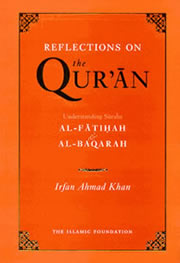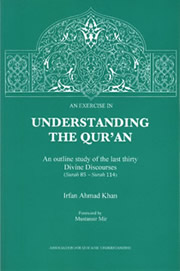Their relative importance and mutual relationship as two related but different sources of knowledge and guidance.
A Futile Debate. The fallacy of those who say “The Quran is sufficient, therefore, Hadith, is not required” is quite obvious. One cannot both believe the Quran and disbelieve Hadith unless one actually does not understand the Quran. Of course, the Quran is sufficient as a source of guidance. But then you should really develop a relationship with the Divine Book and use your abilities and skills in understanding it. And how there can be doubt concerning the importance of Hadith; while the Quran itself establishes the necessity of the Sunnah (whose reports we get through Hadith). Hadith is definitely a most significant source of Islamic knowledge. Instead of wasting our time in the futile debate above we should try that the Muslim people revive their relationship with the Quran so that the above point is clear to them.
- Unfortunately those who try to establish the Hadith is also required, through their wrong argument that the Quran is not sufficient say very little concerning the mutual relationship of the Quran and the Hadith and their relative importance. Very naively, sometimes they would place the Quran and the Hadith parallel to each other saying “both are required” – as if the two were equal in importance, in all respects, and no priorities were involved in deriving guidance through the two sources of knowledge and guidance and as if there was no meaningful relationship between the two.
- The Priority of the Quran is something concerning which there should be no disagreement in the Ummah. The Quran always places “obey God” before “obey the prophet.” And the hadith also places the Book before the Sunnah. Of course it is important that we understand the nature of this priority. Due to our interest in issues of methodological importance, we emphasize the following points.
- The most basic difference between the Quran and the Hadith is that Quran alone is words of God. Even if a hadith is also a linguistic expression of a revelation from God, its status is below the status of “Divine Words.”
Should we say that in such a hadith meanings are revealed from God and these are given verbal form by the prophet? (or maybe by Jabriel, it is important that Hadith Qudsi should be defined as riwayah lul ma’ni – “a report of what God said in the Prophets words.” In Hadith Qudsi; inspite of the fact that God is in the first person, it is the Prophet (or maybe Jabriel) who is conveying in his own words what, apparently, God is saying.
In the Quran, it is God Himself, Who is speaking a language which humans speak. But language is only a medium through which the Divine expression is taking place. Otherwise the linguistic expression of the Quran is free of all human elements. The linguistic expression of the Quran is free of all human elements. The linguistic expression of the Quran is Divine even when God is in the second or third person and when some human being(s) or angel(s) or jinn are in the first person.
On the other hand, the Sunnah introduces a human (or at least a non-Divine) element in guidance. Perhaps this difference between the Quran and the Hadith was not clear to Fazlur Rahman who made such a revelation. He brought the human element in the Quran, the way it is only in the Hadith.
“The Quran is our primary/basic text which is explained/ interpreted through Sunnah.”
The above statement explains the nature of the relationship between the Quran and the Sunnah (and thereby Hadith)
(This relationship is not reciprocal. It will be a mistake to treat the Quran as explanation or interpretation of Hadith or Sunnah or even treat Hadith as more basic.)
The Prophet applied (the guidance of) the Divine Text to the human situation which he and his first believers encountered.
He explained the Divine Words – through his action and speech – to his first addressees.
He accomplished the above tasks under Divine supervision. Whenever, there was a need, God would correct or guide him – maybe through a new revelation. Thus the Prophet worked out the meanings of the Revealed Guidance in Divine Words
a) in a situation
b) to a people
c) without any mistake because, the Prophet alone worked under direct Divine Supervision.
And this believing community (in fact, each of its individuals) is also supposed to keep it direct relationship with the Quran for fresh guidance
a) in changing human situations
b) as its abilities to understand and grow with the progress in human sciences, art, and literature, etc.
c) and do it collectively – correcting and appreciating, mutually.
d) as they keep the Sunnah of the Prophet before their eyes.
The above has methodological implications
(i) To have a true understanding of the Sunnah we must keep before our eyes the Quranic text which is, thus, being explained or interpreted or whose practical implications are being worked out through it.
(ii) It is also required that we consider the people to whom this text is being directly explained by the Prophet i.e. consider their abilities and skills to understand, due to their being at a particular stage of human development.
(iii) Likewise the consideration of the human situation, to which the Quranic guidance was applied by the Prophet and under his guidance by his first believers, is also essential. They saw the Divine Words addressing a particular human situation. It was, in fact, their own situation – the situation of their people and the situation of their world as a whole. And they understood the Quran in this situation. (And this also has to do with the stage of scientific, technological and cultural development that apparently intended in bringing about this situation into existence.)
(Of course, the Sunnah is guidance for all coming generations of mankind – (ii) and (iii) only underline that the later generations that very naturally understood everything from their perspective (and through their own situation) and through their own abilities and skills, should not neglect the stage of human development i.e. the minds to whom the explanation was made and the situation to which the Divine Text was applied.)
While human beings will continue reflecting upon the Quranic ayat with their growing abilities to understand and in their changing human situations, God makes it sure that this task is accomplished by God’s Prophet under God’s own supervision so that there is a model for all following generations,
Thus, in fact, the Sunnah of the Prophet actually worked out such practical implications of the Quran and explicated the meaning of the Divine ayat through his words and deeds the way the believing community, left to it, would have never been able to do. Mainly, we should not overlook the contributions in it of Jibriel, and, of course, of the direct inspirations, the Prophet received from God. As a student of the Quran himself – who was all the time reflecting upon the Divine Words, the Prophet understood very well how these inspirations were, in a way, telling the Prophet what was implied in the Divine Words.)
In the above, F(i)-(iii) aim at restricting the understanding of Hadith by way of these three considerations. Now it is important to note that the progress of (authentic) Quranic understanding should not be hampered by such restrictions. As suggested in the above the believing community which maintains its direct relationship with the Revealed guidance in Divine Words continues understanding its text afresh in changing human situations and with its growing abilities to understand, while guidance of hadith is essential, Hadith role should not be misunderstood as being restrictive of Quranic understanding. Hadith being an understanding of the Quran and not vice versa, keeping the Quran before our eyes is required more in understanding the Hadith, the way keeping the Hadith before our eyes is not required in understanding the Quran.
[Note of caution: We do not deny the illuminating role of the Hadith in the understanding of the Quran. It is expected that those who will keep the Quran before their eyes in the understanding will sometimes receive very illuminating suggestions in the in the understanding of the Quran itself. And it is truer of good students of the Quran.]
The Divine Linguistic Expression (i.e. the Quran) which is in the Arabic language has immense possibilities of meanings inherent in it. However, any other linguistic expression which presents an understanding of it via translation would hold only some of those (possibilities) of meanings. Therefore, a dependence on such an understanding of this Revealed Guidance in Divine Words or any understanding RGDW in its light would block further progress of Quranic Understanding, and some time may even distort it. In fact, such an understanding of this Divine Linguistic Expression – by human beings mainly those other than the Prophet – has the following limitations:
-
- It has the possibility of being a mistaken understanding of Divine Words or it may fall short of being a right understanding of RGDW.
- And even when it is free of such a mistake, this understanding is limited by our limited abilities to understand – due to our being at a certain stage of scientific and technological (etc.) development.
- And this understanding is further limited by our inability to see beyond the human situations which we encounter. (When we see the Text as addressing the human situation, we encounter certain (possibilities) of meaning which are highlighted to us while certain other possibilities may (still remain hidden from us.)
- Due to differences of calibers in a human being and the Divine Being, our understanding as well as the linguistic expression in which we express this understanding always remains far below the Divine counterpart of it. Due to this qualitative difference the linguistic expression which we use as a substitute of the Divine Expression e.g. via translation remains an extremely poor carrier of possibilities of meanings inherent in the Divine Text and our dependence upon it will block all progress of Quranic understanding.
[The belief that guidance is a continuing process, and that the treasures of the meanings of the Divine Words will never be exhausted – as suggested in both Quran and the Sunnah – is based upon the following cosmological presumption:
For the Progress of human understanding and guidance, God has been working on two different planes. He had been sending His prophets and messengers with Revealed Guidance in Divine Words and is still inspiring His faithful readers of the Book though the coming of Wahy (revelation) has stopped. And He has been leading the intellectual and technological evolution of mankind through all this progress in human knowledge. Likewise the developments in the field of humanities also help in the growth of our abilities to understand.]


